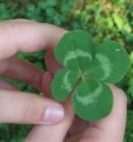Napoleon, when hearing good things about potential senior officers liked to ask, “but is he lucky”?

I’ve known people who have traded the markets for years with only red ink to show for it. From a technical standpoint they seem to know what they’re doing, but they are just unlucky. Or are they?
Napoleon’s question was astute because it’s possible for someone to apparently know what they’re doing but, in the heat of the battle (or in the middle of a trade) deficiencies emerge resulting in defeat. Someone who in battle or trading seems to be consistently lucky is either very good at what they do or is enjoying improbably good fortune.
On a similar theme, when someone commented on how lucky he’d been with a shot he’d played, Arnold Palmer replied:
“It’s a funny thing, the more I practice the luckier I get.”
Unfortunately, this doesn’t seem to work for would-be traders who lose money without fail. No matter how much they practice, they can’t seem to trade consistently profitably.
Clearly the consistently lucky battlefield commander or trader enjoys an edge on his less fortunate colleagues.
Jesse Livermore – in contrast to many self-made men – was happy to put some of his successes down to luck.
Of his 1915/16 comeback from bankruptcy, and his $3 million profit, he said:
“I was very lucky. I was rampantly bullish in a wild bull market. Things were certainly coming my way so that there wasn’t anything to do but to make money.”
And
“As you may remember, I was busy ‘coming back’ in 1915. The boom in stocks was there and it was my duty to utilize it. My safest, easiest and quickest big play was in the stock market, and I was lucky, as you know.”
Speaking of luck in more general terms, he said:
“Of course, if a man is both wise and lucky, he will not make the same mistake twice. But he will make any one of the ten thousand brothers or cousins of the original. The mistake family is so large that there is always one of them around when you want to see what you can do in the fool-play line.”
Avoiding Mistakes
Jesse is pointing out that successful traders need to minimize mistakes. It’s the same in war, or in sports contests. Most battles and sports games are not won by moments of genius – these are few and far between. The contestants who make fewest errors win most contests.
The “lucky” trader is one who minimizes mistakes AND, if they do make a mistake, acts to minimize the damage by exiting from the situation quickly. In practice this means having a written plan for each trade you enter, the most important element of which is the stop-loss.